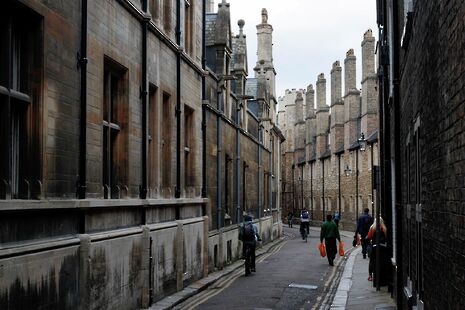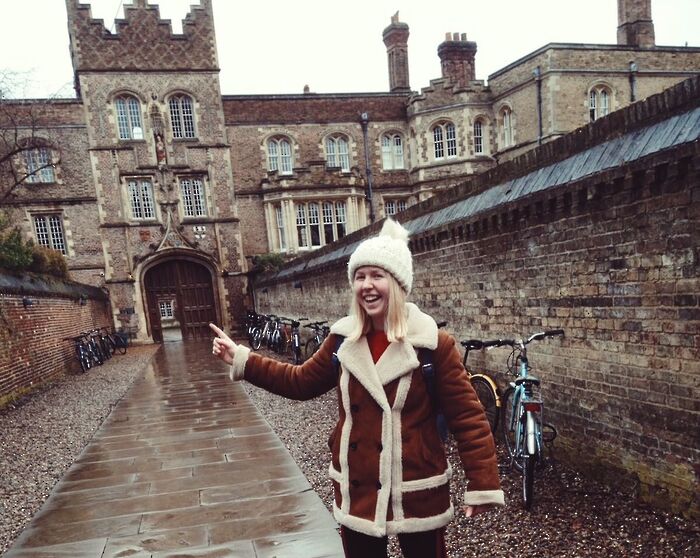‘Coming out’ is more than just a moment
“Cambridge is a fantastic place to be LGBT+, but don’t worry if it takes some time for you to settle in,” writes Joe Heath in the latest Letter to Freshers

Unlike many others in the LBGT+ community, I was fortunate enough to be raised in an open-minded and supportive family. But growing up in a small and sometimes conservative village where there were few other gay men like myself, my sexuality marked me as ‘different,’ and I struggled to fully come to terms with it. I also grew up lacking both extensive experience of sex and relationships and LGBT+ role models I could look up to or turn to for guidance in my everyday life.
So for me, university held great promise as a ‘fresh start.’ I saw Cambridge as a place where I could be myself from the very start and avoid the awkward and anxiety-inducing process of ‘coming out’ to those around me. It would be a place where I could be part of a bigger community — a place of new encounters and new relationships, and of growth and development.
What would you say to your fresher self?
Write for Varsity's annual series, Letters to Freshers. Just email our Features team with a 150-word pitch with a story to tell about your time at Cambridge.
In many ways, my experience as a gay fresher has been a wonderful one. Both my college and the university are home to positive and friendly LGBT+ communities, even if a great deal of work remains to be done to engage with the experiences and perspectives of LGBT+ people across boundaries of class, race, and so on. For the first time, I was surrounded by confident, inspirational LGBT+ role models who were not afraid to talk about their sexuality, and with whom I felt able to discuss my own. The simple fact of being surrounded by these people has in many ways had a transformative impact on my time here.
Even so, I encountered challenges. I had imagined that at university, I would simply become what I wished to be — an out and proud gay man. But in reality, this process of ‘becoming’ turned out to be far more complicated than simply moving away from home and forging a new identity for myself.
There are many ways to love and be loved, and being LGBT+ does not mean having to choose between them
Cambridge is, to put it bluntly, very gay, and as a fresher, it took some time to get used to the number of opportunities for encounters with other men here. The contrast between the sleepy village I grew up in and the frantic atmosphere of the first Glitterbomb of Michaelmas Term could not have been greater. On the sweaty dancefloor of Life, or the sweatier-still dancefloor of King’s Bunker, I did not feel as comfortable as I had imagined I would. Instead, I felt disoriented and, in all honesty, a little overwhelmed. As I awkwardly stumbled through this landscape where being gay meant being ‘out and proud,’ I struggled to find the right words with which to express these experiences and articulate my anxieties. How could I locate myself within this community when I had not yet fully come to terms with my sexuality?
Coming out is both an internal and an external process, and in many ways the former is far more challenging. Coming out to friends during my teenage years was frequently a case of stating the fact before offering up the reassurance: that I was gay, but not that gay, distancing myself from a part of my identity which I had not yet wholly accepted. This reassurance was directed as much at myself as to my peers, and it was only in my first year when I confronted what I can recognise now as internalised homophobia that I came closer to understanding what it really meant to be ‘out’ as my fullest self.
There are many ways to love and be loved, and being LGBT+ does not mean having to choose between them. Maybe Tinder is your thing, or maybe it’s Grindr. Maybe sex is something you enjoy in a relationship, or maybe not at all. It is just as important to be proud of the way you choose to love as it is to take pride in the way others within the LGBT+ community choose to do so. We would not seek to depict straight men as a homogeneous group, and neither should we make the same assumptions about gay men, or LGBT+ people more generally. I have learnt during my short time here to show solidarity with those in our community who differ from myself, appreciating that their struggles are greater than my own.
I would advise LGBT+ freshers to be open-minded and supportive of others, whilst knowing that you are free to be different, and to love in your own way. Most importantly, be patient. For many of us it can take time to adjust to the freedom of university life, and to place unreasonable expectations on others or yourself is deeply unfair. If you find yourself in need of someone to talk to or turn to for advice and guidance, your College JCR is there to support you, as are the CUSU liberation campaigns, which provide welfare support for students across the university.
Cambridge is a fantastic place to be LGBT+, but don’t worry if it takes some time for you to settle in.
 News / Judge Business School advisor resigns over Epstein and Andrew links18 February 2026
News / Judge Business School advisor resigns over Epstein and Andrew links18 February 2026 News / Gov grants £36m to Cambridge supercomputer17 February 2026
News / Gov grants £36m to Cambridge supercomputer17 February 2026 News / CUCA members attend Reform rally in London20 February 2026
News / CUCA members attend Reform rally in London20 February 2026 News / Union speakers condemn ‘hateful’ Katie Hopkins speech14 February 2026
News / Union speakers condemn ‘hateful’ Katie Hopkins speech14 February 2026 News / Hundreds of Cambridge academics demand vote on fate of vet course20 February 2026
News / Hundreds of Cambridge academics demand vote on fate of vet course20 February 2026










